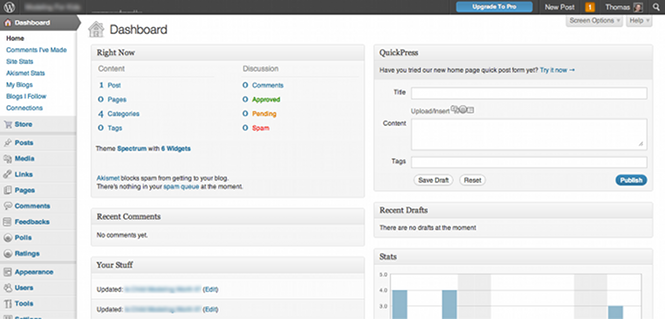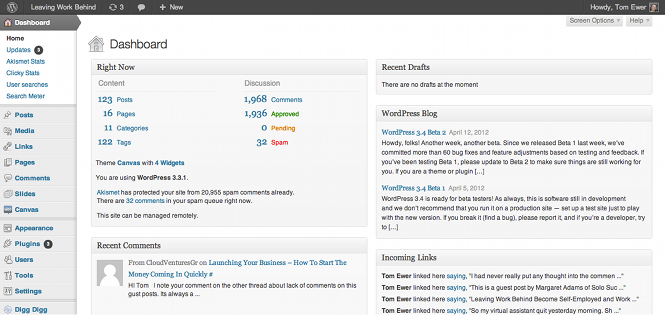By Tom Ewer
When I was first starting out with WordPress, I was rather confused by the fact that there seemed to be two versions. I had previously built websites from scratch using HTML and a web builder program called Xsite Pro, that I still use, so the world of content management systems was new to me. And before I had even started – before I even had a particularly good understanding of what WordPress actually was – I had to make a choice.
I don’t think there is a particularly good comparison piece between WordPress.com and self-hosted WordPress out there. In fact, I don’t think that even WordPress.com does a particularly fair job of comparing the two options (we’ll get into why later). So I am going to explain my take on the differences between WordPress.com and self-hosted WordPress, so that you can make a more informed decision as to which option to take.
What Is The Difference?
In my opinion, the main issue when deciding whether to choose WordPress.com or self-hosted WordPress is having a true understanding of the structural difference.
The best analogy I can think of to make clear the differences between WordPress.com and self-hosted WordPress is that of computers. Self-hosted WordPress is the equivalent of buying your own PC. It is yours to do with as you wish – you can add components, install software, browse the internet unrestricted – the world is your oyster. Meanwhile, WordPress.com is the equivalent of using a library computer. You’re operating within a controlled environment. You do not have the same freedom as you would have with your own PC.
That, in a nutshell, is the main difference. WordPress.com is restricted – self-hosted WordPress is not.
So Why Bother With WordPress.com?
If you are happy to work within the restrictions, you can have a site up and running at no cost – the same cannot be said for self-hosted WordPress. But that’s not all – WordPress.com offers some additional features that do not come as standard with self-hosted WordPress. For someone who only has a very casual or tentative interest in web publishing, WordPress is a great starting ground. Sign up, log in, and get posting.
But in this author’s humble opinion, WordPress.com is not a viable long-term solution for most people looking to take anything more than a casual interest in blogging.
Pros and Cons
At this stage it would be pertinent to take a closer look at how WordPress.com and self-hosted WordPress differ. First of all, it is important to note that on a macro level, they are one and the same. They are based upon the same piece of software. But whilst self-hosted WordPress just hands over the keys and lets you drive, WordPress.com packages the software up in a somewhat restrictive way, then gives you control of what is left.
Here is a rundown of what WordPress.com has to offer over self-hosted WordPress, straight out of the box:
- Free hosting (up to 3gb)
- Automatic backups
- Automatic upgrades
- No custom themes or plugins
- No PHP/CSS customization
- Monetization (through advertising, affiliate links, etc) is not allowed
- WordPress.com will run their own advertising on your site
- No custom analytics
Here is a rundown of what self-hosted WordPress has to offer over WordPress.com:
- Unrestricted theme and plugin uploads
- Complete control over your site
- You will need to pay for a domain and hosting
Myths Dispelled
There seem to be certain false preconceptions about both WordPress.com and self-hosted WordPress, and I would like to take this opportunity to dispel them.
1. WordPress.com is a Charity
WordPress.com is a commercial enterprise like any other. They offer a free service in the hope that you will eventually pay for premium features.
You could spend $17 on domain mapping, $20 on extra hosting, $30 on basic design customization, and $30 to remove advertisements. Before you know it you’ve forked out close to $100, and you’ve just done a bad job of emulating a self-hosted WordPress installation that would have cost you about $70 (for a year).
2. Using Self-Hosted WordPress Requires Mad Skills
You do not need to be a technical genius to use self-hosted WordPress. Here’s what the two interfaces look like:


In what way is self-hosted WordPress supposed to be more complicated?
The fact is, it is barely any more difficult to set up a self-hosted WordPress site than it is one on WordPress.com. Buy a domain and hosting, install WordPress with the one click install process found on any reputable hosting provider. A quick search on Google will tell you everything you need to know. Yes, one could argue that WordPress.com is more straightforward for the completely uninitiated, but the gap is not nearly as wide as some make it out to be.
3. Self-Hosted WordPress Costs Money
Self-hosted WordPress is open source and completely free. It is the domain name and hosting that costs you money. That’s $10-15 for the domain for a year from GoDaddy or NameCheap, and for 7.95 a month for hosting from BlueHost or HostGator. So that is just over a $100.00 for a year.
Which Is For You?
I am clearly an exponent of self-hosted WordPress, but that does not mean I have anything against WordPress.com. I just feel that there is a far better solution for the vast majority of people.
And of course, we are huge fans of custom themes and plugins – which are not allowed by WordPress.com. If you are new to the world of WordPress, you probably do not yet understand the sheer scope of what you would be missing out on by going with WordPress.com.
But ultimately it is up to you. If you want a simple, free and limited service to build your own basic blog, WordPress.com is arguably the best service of its type. You get free hosting, free backups, and a user-friendly interface with which you can start blogging in minutes. But if you want to unleash the full power of WordPress, there really is only one option.
Author: Tom Ewer
Tom is the founder of Leaving Work Behind, a blog for anyone interested in online business and/or self-employment. Get in touch via Twitter or check out his Facebook page.
[…] What is the difference between WordPress.com and a self hosted WordPress website? […]